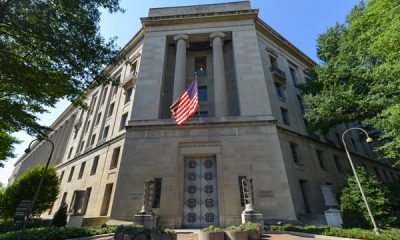Los Angeles
Equality California celebrates 20 years of legislative activism
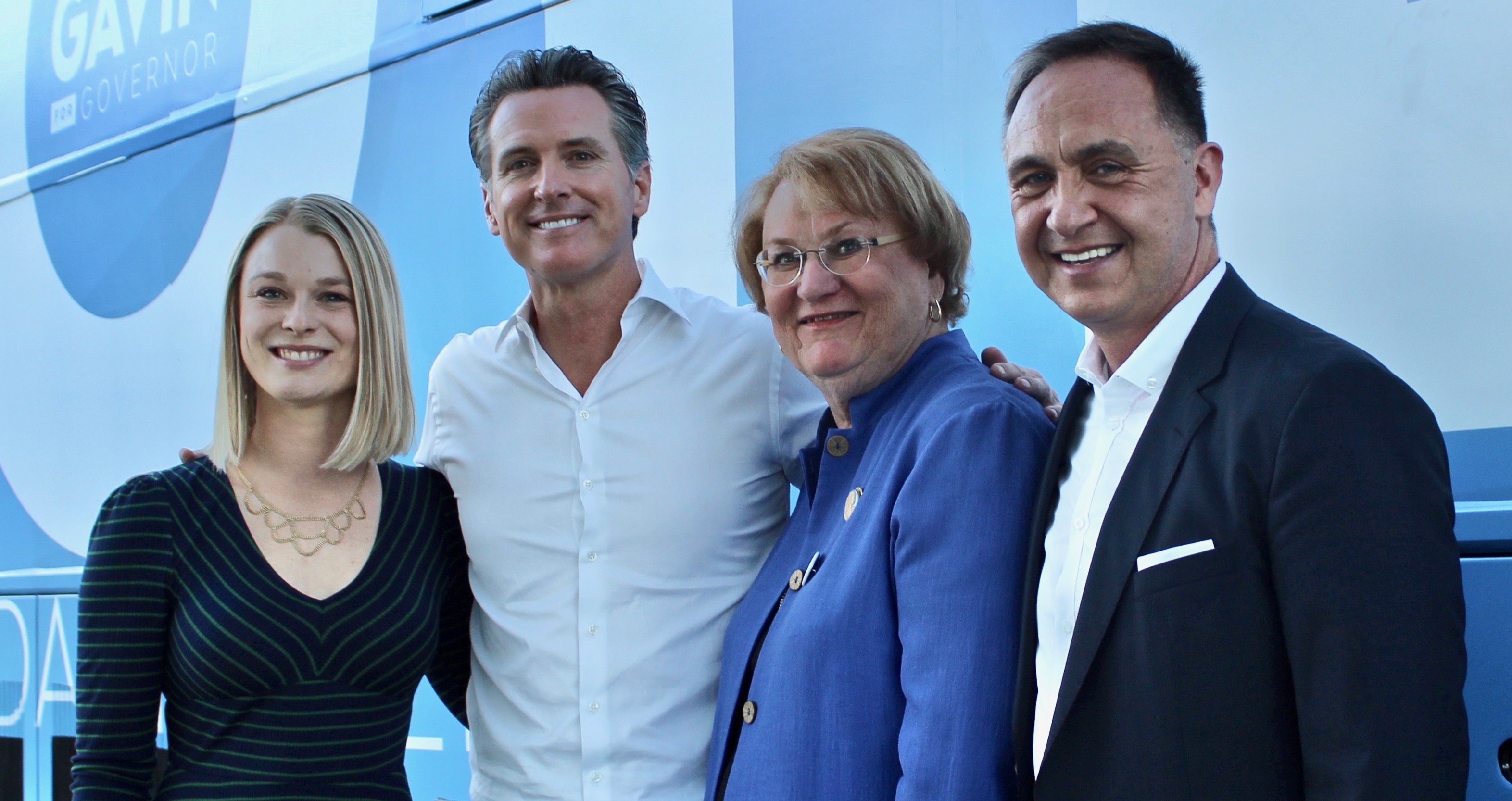
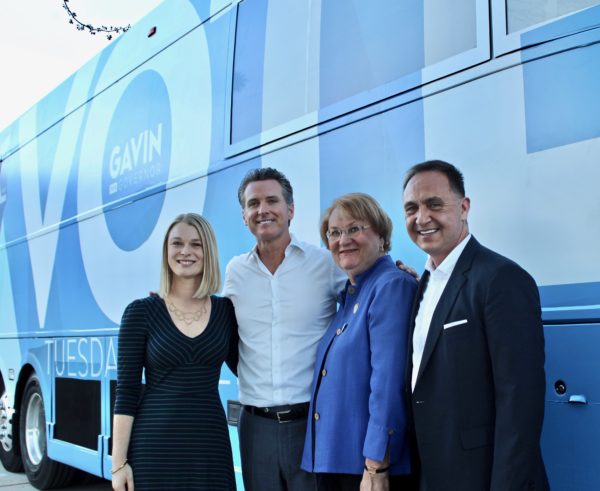
Bisexual Palm Springs City Councilmember Christy Holstege, gubernatorial candidate Gavin Newsom, trans Palm Springs City Councilmember Lisa Middleton, Rick Zbur, executive director of Equality California (Photo courtesy EQCA)
History doesn’t just make itself. History happens at an inflection point when fed up individuals come together and organize to make change. Different groups take different approaches to an issue but for change to stick, it needs to become law. This is particularly true for LGBTQ people who are still not equal to their fellow citizens under federal and many state and local laws. That’s why Equality California’s 20 years of successful legislative activism has become a model for other statewide LGBTQ civil rights organizations.
But Equality California stands on the shoulders of brave souls who paved the way through the dark, tangled thicket of entrenched and institutionalized homophobia.
California has a long track record of creating change, starting with the Mattachine Society, the Daughters of Bilitis, ONE Magazine, the Society for Individual Rights (SIR) in the 1950s. In the 1960s, gay and lesbian activism intertwined with the anti-Vietnam War, Women’s Liberation and Gay Liberation movements. But ironically, the Black Cat and Stonewall rebellions in the late 1960s also sent people “scurrying into closet” fearing exposure through police arrests at bar raids, according to attorney and businesswoman Diane Abbitt.
“There was a lot of shame. People were terrified of losing their jobs. A lot of them were teachers and professional people,” Abbitt tells the Los Angeles Blade. “And it impacted businesses. There was a lesbian bar in Redondo Beach where the police kept coming in on the pretext that they were looking for a runaway.”
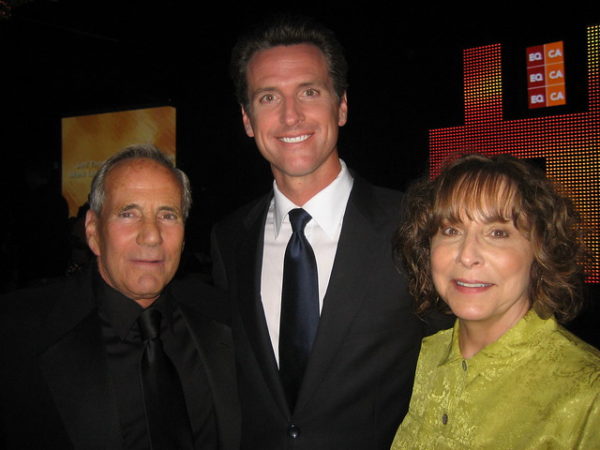
Checkbook activist and Equality California Board member Diane Abbitt, with EQCA honoree San Francisco Mayor Gavin Newsom and consultant Bob Burke in 2008. (Photo by Karen Ocamb)
By the 1970s, the fight for equal protection under the law hit the political scene and the California Legislature. In 1971, the Alice B. Toklas Memorial Democratic Club of San Francisco formed to train activists to become political professionals and engage with the Democratic Party. In 1975, Stonewall Democratic Club was founded in Los Angeles and Assemblymember Willie Brown arduously secured passage of a consenting adults law that didn’t exactly decriminalize homosexuality—sodomy or oral copulation laws remained on the books—but private consensual activity between adults over 18 was no longer illegal. In 1977, Assemblymember Art Agnos started pushing for a gay rights job bill and Harvey Milk was elected to the San Francisco Board of Supervisors. The following year, a statewide coalition of activists defeated the anti-gay Briggs initiative and Milk was assassinated.
Meanwhile in LA, the Municipal Elections Committee of Los Angeles (MECLA) became the first gay political action committee (PAC) contributing money to local pro-gay politicians. “We wanted to change the quality of life for gay people so they could be who they are – and they wanted to do that through political action,” says Abbitt, MECLA’s first female board co-chair who later served on the EQCA board and became PAC chair. MECLA became so prominent, Gov. Jerry Brown gave the keynote speech at a 1979 roast for philanthropist businessman Sheldon Andelson.
There were a record 71 openly lesbian and gay delegates to the 1980 Democratic Convention, 17 of whom came from California. The Democratic Party Platform included a gay rights plank. But Democratic President Jimmy Carter lost to former California Republican Gov. Ronald Reagan in 1980 and everything changed.
Though the first AIDS cases reported to the CDC in 1981 of five gay men from Los Angeles exploded into “1,112 and Counting,” as Larry Kramer put it in 1983, the religious conservative Reagan administration did little to nothing. But AIDS brought together the leaders of numerous LGBT groups to form LIFE AIDS Lobby to push AIDS legislation in Sacramento.
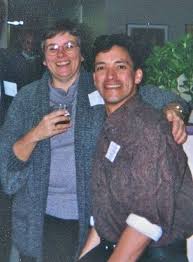
LIFE Lobby Board Co-Chair attorney John Duran and Executive Director Laurie McBride at AIDS Action event during Bill Clinton’s Inauguration in Jan. 1992 (Photo by Karen Ocamb)
LIFE worked with allies like Willie Brown and David Roberti, whose openly gay aide Stan Hadden wrote bills and coordinated the legislative response. LIFE also pushed back on anti-gay/AIDS bills and other measures such as the AIDS quarantine initiatives. John Duran, a volunteer attorney for ACT UP/Orange County, joined the LIFE AIDS Lobby board and wound up serving as co-chair from 1988-1992, working with executive director, Laurie McBride. By the time Republican Gov. Pete Wilson vetoed AB 101 in 1991, LIFE Lobby included members as diverse as transgender ACT UP/LA AIDS activist Connie Norman and Log Cabin Republican Club co-founder Frank Ricchiazzi.
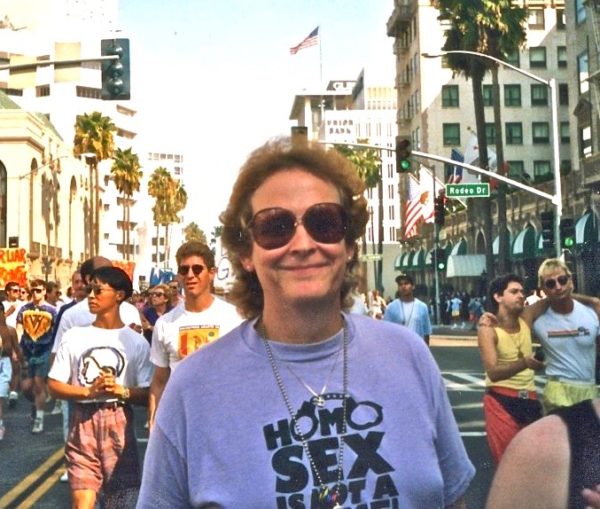
The late AIDS Diva Connie Norman marching in AB 101 protests in Beverly Hills in 1991 (Photo by Karen Ocamb)
In the 1990s, state politics was dominated by conservative anti-gay Republicans. Out attorney Sheila James Kuehl took on the challenge, becoming the first openly gay person in the California Legislature and the first member of the LGBT Legislative Caucus. But in 1998, despite the turning point of Democrat Gray Davis’s election as governor and the promise of new life-saving AIDS medications, LIFE Lobby ran out of money and folded.
But longtime politicos recognized the need for political and legislative activism and California Alliance for Pride and Equality (CAPE) quickly emerged from the ashes in 1999 with longtime San Francisco politico Jean Harris as executive director. Geoff Kors, a graduate of Stanford Law School and a lawyer in private practice, was one of nine members who sat on CAPE’s Board of Directors—which now constituted individual board members, not representatives from different statewide organizations.
When Harris left in 2003 – having helped pass Assemblymember Carole Migden’s AB 25 domestic partner registry bill and Kuehl’s AB 537, the first statewide LGBT-inclusive anti-bullying law – Kors stepped in as executive director and changed the organization’s name to Equality California.
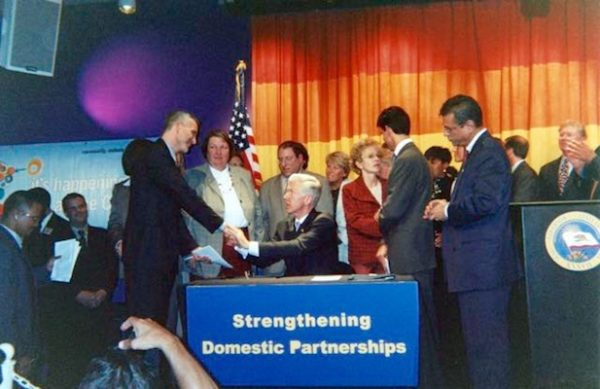
Kors grew the organization into a national model. First, in 2003, working with gay friend Assemblymember Mark Leno, they secured passage of Leno’s AB 196 adding gender identity to employment and housing protections. That year, he also helped secure passage of AB 205, Assemblymember Jackie Goldberg’s expanded domestic partnership bill that was essentially civil unions by another name.
In 2004, as the Religious Right pressured President G. W. Bush to pass a federal constitutional amendment banning gay marriage, Equality California merged with Marriage Equality California and focused on both affirmative and counter measures. In 2005, Leno’s first marriage bill, AB 849, passed the Legislature, only to be vetoed by Gov. Arnold Schwarzenegger. Marriage equality became a key gay and lesbian civil rights issue but marriage equality was upended by the passage of Prop 8 in 2008. It was eventually overturned.
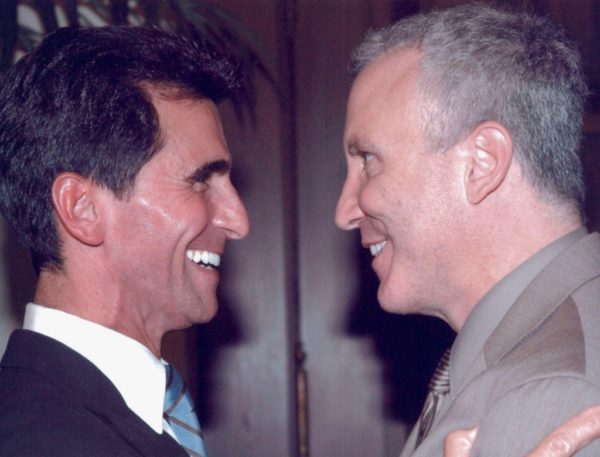
Assemblymember Mark Leno and Equality California Executive Director Geoff Kors excited over passage of Leno’s marriage equality bill. (Photo courtesy Kors)
Kors left Equality California in March 2011 after a hugely successful tenure, concluding with passage of State Sen. Mark Leno’s SB 4, the FAIR Education Act that established an inclusive curriculum.
Kors was followed by Roland Palencia, who served a year, followed by incredible ally Laurie Hasencamp, who stabilized the troubled organization, then John O’Connor who joined the organization in December 2012. During their tenures, Equality California worked to pass Ted Lieu’s SB 1172 “reparative therapy” bill to protect LGBT youth from psychological abuse; Assemblymember Tom Ammiano’s AB 1266, the School Success and Opportunity Act, protecting and prohibiting the exclusion of trans students from classes and activities; and Assemblymember Susan Bonilla’s AB 2501, prohibiting use of the “panic defense” based on sexual orientation or gender identity.
When O’Connor left, Rick Zbur, a longtime political and environment activist, retired in 2014 from his senior law partnership with Latham & Watkins to take the executive director job, which also includes working with the Equality California Institute and the community Equality Council.
Equality California has expanded, re-branded and flourished under Zbur’s leadership, broadening the scope of the organization’s mission to focus on intersectionality and look at health disparities, especially in people of color communities, and the rights of trans people and LGBT undocumented immigrants. The expansion included hiring Valerie Ploumpis as National Policy Director based in Washington DC and launching Silver State Equality in Nevada.
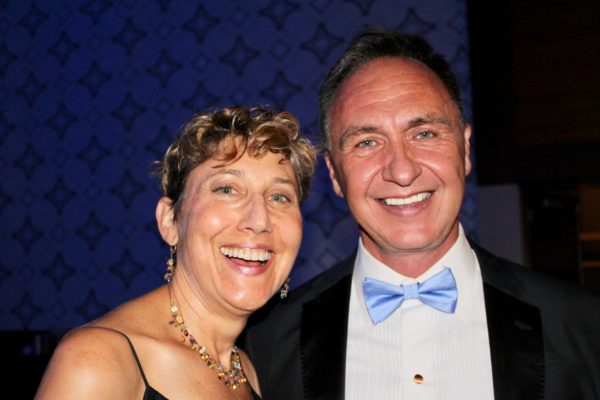
National Policy Director Valerie Ploumpis and Executive Director Rick Zbur (Photo by Karen Ocamb)
This year, Equality California had 13 bills and resolutions; seven passed the legislature; one has been signed into law; and six bills were turned into two-year bills.
“It was a challenging year for us. I’ve got to admit that. Part of that is because our bills are more challenging and in many ways, we’re tackling tougher issues that impact our community in significant ways,” Zbur tells the Los Angeles Blade. “Many of the strategies that we are pursuing cost money. So that is something that we’ve got a lot of work to do to educate the legislature about the need to prioritize our community as they’re allocating budgetary resources. We’ve got a lot of work to do next year to get those six bills passed.”
Gov. Newsom signed AB 711 by Assemblymember David Chiu. “That basically ensures that local educational agencies in California are required to update the records of their former students who identify as transgender, so that their legal name and their gender are accurately reflected in documents like high school diplomas and school transcripts.” Says Zbur.
Assemblymember Todd Gloria’s AB 493, Safe and Supportive Schools, is on Newsom’s desk but minus a key component – Mandatory Teacher and Staff Training Element, which was pulled because the budgetary funding was insufficient. “We have an agreement and understanding with the governor’s office that we will bring back the mandatory training elements of the bill next year. They made a commitment to us to work on a funding package as part of next year’s budget,” says Zbur. “We’re optimistic that the governor and his staff have actually prioritized LGBTQ school safety as an issue to tackle in sort of a comprehensive way next year.”
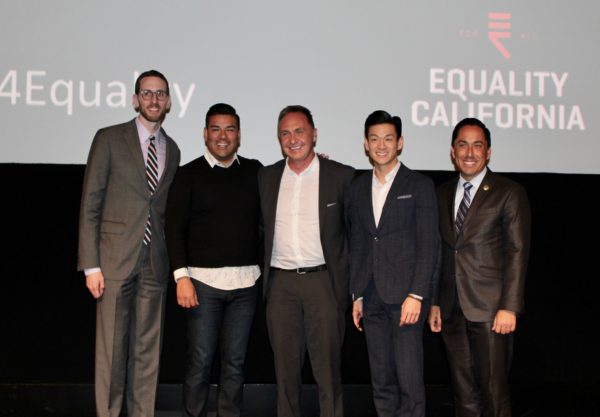
State Sen. Scott Wiener, then-Insurance Commissioner candidate Sen. Ricardo Lara, Equality California Executive Director Rick Zbur, LGBT Legislative Caucus Chair Assemblymember Evan Low, and Assemblymember Todd Gloria at an EQCA event. (Photo by Karen Ocamb)
Another major bill awaiting a signature is SB 159, PrEP and PEP Access Expansion bill by Sen. Scott Wiener. The bill “basically authorizes pharmacists to furnish PrEP and PEP to patients without a prescription, which eliminates one of the key barriers to getting coverage,” says Zbur. Now, if someone can’t get a doctor’s prescription over the weekend, PrEP and PEP is over available at an emergency room.
“That costs a lot of money and for people that have inadequate insurance, it is a huge barrier. So this bill would fix those circumstances,” says Zbur. “It also prohibits insurance companies from requiring prior authorization from insurance companies for at least that initial prescription for PrEP.”
Another bill, SB 495 by Senator Maria Elena Durazo, tackles child custody determinations, modifying the family code “to prohibit discrimination on the basis of sexual orientation or gender identity of a parent or legal guardian or relative when granting and making decisions on custody of a child, which is an important new non-discrimination protection that is now embedded in our law.”
Additionally, AB 785, by Senate Assemblymember Richard Bloom “streamlines the transfer of donor medical information for families in donor conceived individuals” is also on Newsom’s desk.
The tough two-year bills include the complicated Intersex Bodily Autonomy bill, which was pulled early to allow for more education. “Basically it protects the rights of intersex Californians to ensure that they can provide informed consent before medically unnecessary and sometimes irreversible and harmful procedures are performed on them as babies,” says Zbur. “At its core, this is about protecting and respecting an individual’s own determination of their gender identity.”
Another now-two-year bill by Senator Wiener, SB 132, the Transgender Respect Agency and Dignity Act, primarily dealing with how trans inmates are housed in prison. “We, as a coalition, elected to take a pause and work on some details on the bill that we think will allow us to get it passed next year,” Zbur says. “As you might expect, there’s a high amount of engagement with the California Department of Corrections.”
And then there was the dustup with Assembly Appropriations Chair Lorena Gonzalez, who placed Wiener’s SB 145 Sex Offender Registry bill on suspense without explanation, turning it into a two-year bill. The bill would fix the state’s discriminatory practice of treating LGBT young people differently than their non- LGBTQ peers when engaging in voluntary sexual activity
“We obviously expressed our concern about how this bill was treated. But we are planning on working with the Assembly Appropriations Chair next year and are dedicated to continuing to fight to get this through,” says Zbur.
“I think [Gonzalez] considers herself an ally. But I think she really doesn’t fully understand our issues. It’s inappropriate for her to really try to pit a bill that is trying to fix discrimination against LGBTQ people against folks in the criminal justice advocacy area, who would oppose any sort of increased criminalization of something.”
Apparently, Gonzalez hated the bill. “She wanted this gone. She had concerns about the underlying law. That’s something that she should do as a separate bill. We obviously took issue with the fact that she wanted to tie concerns that she had with the underlying law to an LGBTQ bill to fix discrimination for our community,” Zbur says.
Two other bills, SB 741 and AB 650, “got bollixed up because of some of the details,” says Zbur. One allows trans Californians to update their marriage certificates and birth certificates while still protecting their privacy and the other is about LGBTQ data collection. A third bill, AB 307, by Eloise Gomez Reyes and Senator Wiener regards a homeless youth grant program for which there was no money in the budget.
“One of the challenges that we’re facing is that many of the things that we need to do in California do cost money now,” says Zbur. “So we’ve got a lot of work to do to really hold our legislators and legislature accountable to prioritize the needs of our community. These bills are essentially a drop in the bucket compared to the broader state budget. But really, just the commitment isn’t there yet among many of the folks that are making these decisions. So we’ve got a lot of work to do and that’s what we’re going to be focusing on next year.”
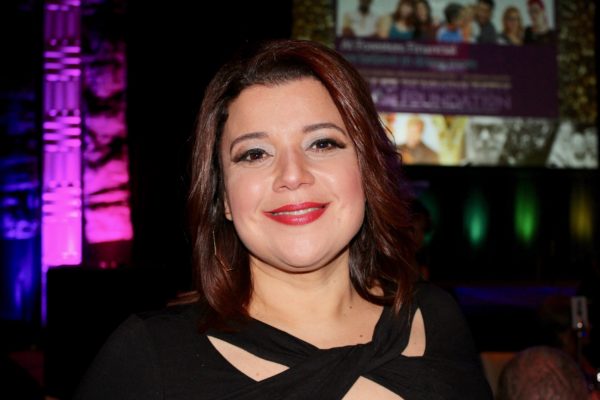
CNN commentator and outspoke Trump critic Ana Navarro (Photo by Karen Ocamb)
Zbur says their Equality California 20th Anniversary Awards on Sept. 28 at the J.W. Marriott Hotel “should be the biggest gala that we’ve ever had,” with an expected attendance of more than 1200 people. The honorees are Jill Soloway, creator and executive producer of the Amazon original series Transparent, with the Equality Visibility Award; CNN political commentator Ana Navarro with the Ally Leadership; Latham & Watkins, LLP and attorney Amy Quartarolo, who will be honored together with the Community Leadership Award – Latham & Watkins, contributed almost $3 million in free legal services to Equality California over the last three years; and past Equality California Board President Andreas Meyer, who led the organization’s board of directors from 2012-2016.
Meyer was Board president when Zbur was hired and “developed the strategy that the organization is following now—one that is very intersectional and really focused on addressing the disparities in health and wellbeing that our community faces.”
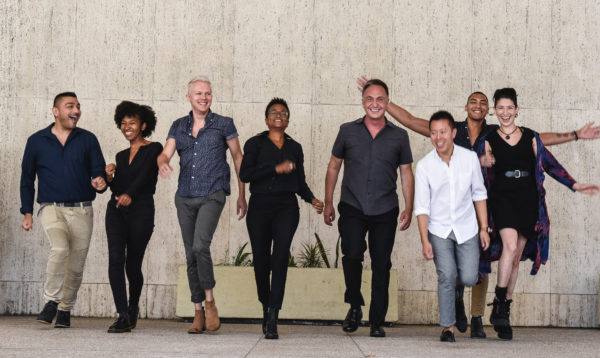
Equality California staff: From left: Program Director Robbie Rodriguez, Program Associate Marisa London, Communications Director Samuel Garrett-Pate, Director of Finance & Administration Valecia Phillips, Executive Director Rick Zbur, Managing Director Tony Hoang, Program Manager Jeremy Payne, Grants Associate Allie Hughes (Photo by Claudia Unger & Francesca Di Amico, courtesy of Equality California)
Zbur also says he is “actually very lucky to have an incredibly committed board and an incredibly committed staff. I mean it’s really a team effort. But when I came in, it was a time in which a lot of folks were asking the question: why do we need Equality California? We were so associated with the fight for marriage equality and that was behind us. Andres was an incredibly important leader of our organization during that transition,” as were Jackie Thomas and Joyce Rowland at the Equality California Institute.
“For two decades, Equality California has led the Golden State’s fight for LGBTQ civil rights and social justice,” says Zbur. “And after 20 years in this fight — even in these challenging times — I couldn’t be more hopeful. I have hope for our future because like our fledgling board back in 1999, I know the next generation of leaders are unafraid, unjaded and don’t give a damn what the cynics have to say.”
California
Williams Institute reports impact of deportations on LGBTQ immigrants
Latest report suggests transgender, nonbinary and intersex immigrants face significantly higher safety risks
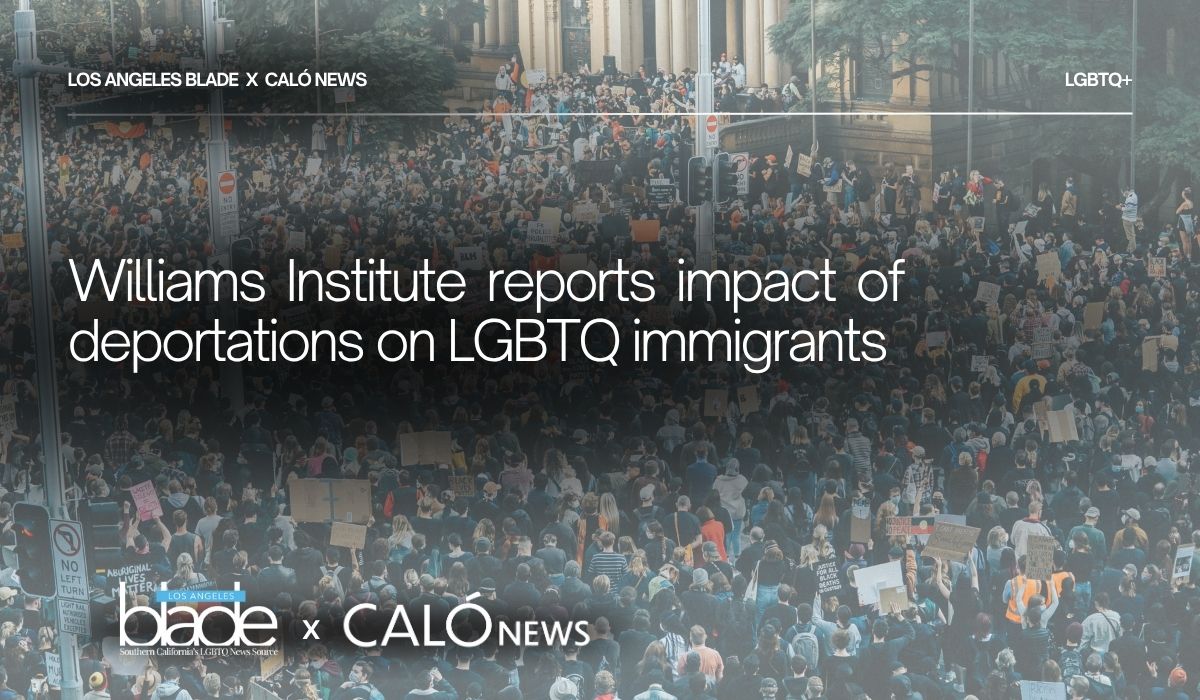
Williams Institute at UCLA has released its latest report, highlighting the intersection between LGBTQ and immigration issues and the impact of the U.S. Customs and Immigration Enforcement (ICE) raids across Los Angeles on LGBTQ people.
According to the brief, LGBTQ immigrants who hold legal status, but who are not naturalized citizens may also face challenges to their legal right to reside in the U.S.
Recent reports indicate that non-citizens with legal status are being swept up in immigration operations and several forms of legal status which were granted at the end of the Biden administration are being revoked. Those include: Temporary Protected Status (TPS) for some Venezuelan immigrants, as well as those from Afghanistan and Cameroon, while Haitian nationals are now facing shortened protection periods, by up to six months.
The Justice Department has proposed a new rule which grants the government border authority to revoke green card holders’ permanent residency status at any time. This rule is currently under review by the Third Circuit Court of Appeals, which could significantly affect non-citizens who are currently documented to reside in the county legally.
Supervisorial District 1, under Supervisor Hilda L. Solis, and Supervisorial District 2, under Supervisor Holly J. Mitchell would particularly be affected as it contains the city center of Los Angeles and nearly 29,000 LGBTQ, noncitizens would face the harshest impact. Those two districts contain many of the county’s historically Black, Latin American and Asian, Pacific Islander neighborhoods.
For transgender, nonbinary and intersex immigrants arrested or detained by ICE, there are additional impacts regarding how federal law defines biological sex and gender identity. The Trump administration has signed an executive order which redefines “sex” under federal law to exclude TGI individuals. This adds an extra thick layer of possible violence when TGI individuals are placed in detention centers or in holding that does not correspond to their identity.
According to the report, ‘transgender, non-binary, and intersex immigrants must navigate an
immigration and asylum system without information about how federal agents will respond to their gender identity and with the risk of greater violence if placed in detention centers, given the effects of this executive order.’
The brief estimates the number or foreign-born adults in Los Angeles County who will be potentially affected by the Trump administration’s executive orders on mass deportations.
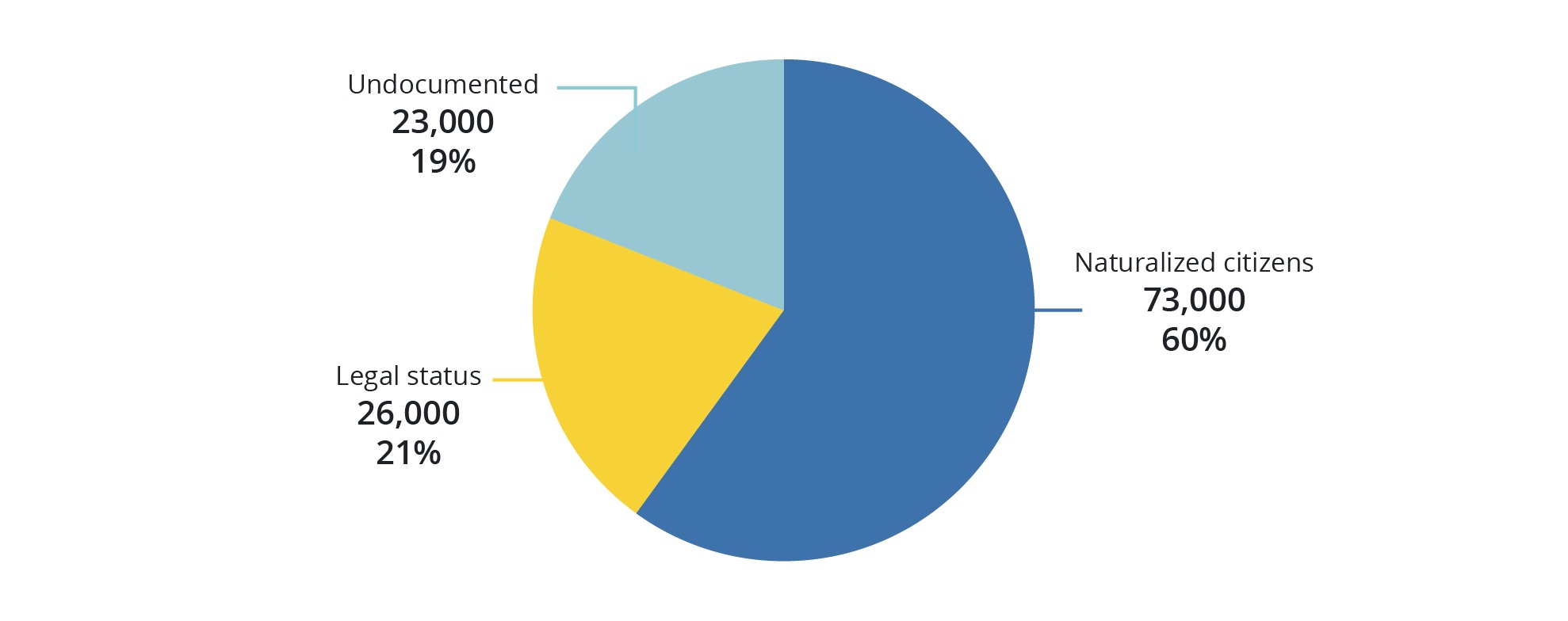
Graphic courtesy of Williams Institute at UCLA.
Using previous data from other Williams Institute Studies and reports from the University of Southern California Dornsife Equity Research Institute and data from the Pew Research Center, the latest brief states that there are over 1.35 million LGBTQ-identifying people across the U.S., with 30% of them residing in California.
The report further points to 122,000 LGBTQ immigrants who reside within LA County specifically, making Los Angeles County home to about 10% of all LGBTQ adult immigrants in the U.S.
While 18% of those Angelenos are foreign-born, only around 7%, or 49,000 of them do not hold legal status.
Using research from the Pew Center and applying an estimate, that means that there are approximately 23,000 undocumented LGBTQ across LA County and the remaining 26,000 LGBTQ immigrants in the county have some form of legal status.
Among the LGBTQ population of adult immigrants in California, approximately 41,000 are transgender or nonbinary. That figure also points toward approximately 5,200 of them residing in LA County. According to the proportions applied for this estimate, the Williams Institute approximates that around 3,100 transgender and nonbinary immigrants in LA County are naturalized citizens, over 1,100 have legal status and just under 1,000 are undocumented.
According to a brief released in February by the Williams Institute, ‘mass deportations could impact 288,000 LGBTQ undocumented immigrants across the U.S.
Los Angeles
LA Black Pride: ‘We are no longer waiting to be seen’
Joy as power, presence as protest, visibility that refuses to be diminished
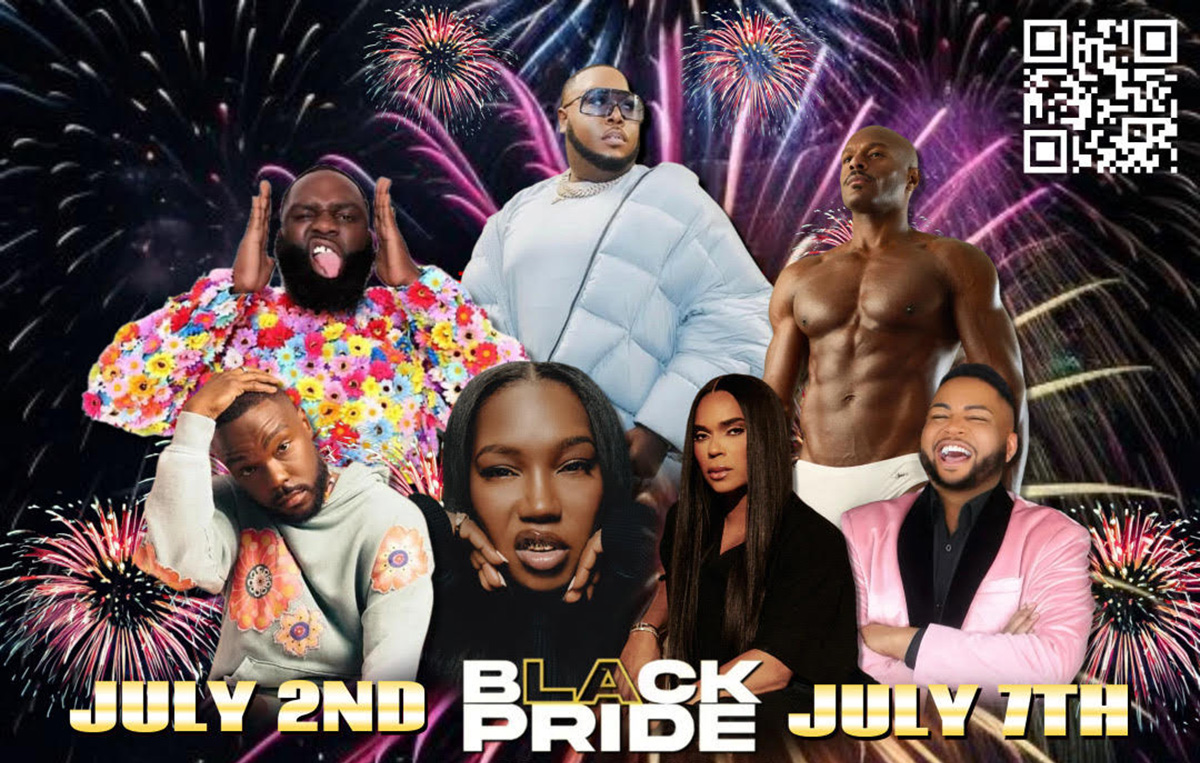
As Los Angeles Black Pride (LABP) gears up for another saucy season of celebration, culture, and resistance, we are proud to announce a new six-week media partnership between LABP and the Los Angeles Blade. This collaboration is not just promotion but intention. It is about making sure Black queer voices are not just heard, but honored and amplified.
To kick it off, we are excited to announce that Saucy Santana will headline LABP’s Saturday night main stage. Known for their unapologetic energy, queer-centric bops, and fearless showmanship, Santana represents exactly what LABP is about — joy as power, presence as protest, and visibility that refuses to be diminished.
The theme for LABP 2025 is “Black Queer Futures Are Now: We Are No Longer Waiting to Be Seen.” Our partnership sets the tone for what’s to come. It is a shared commitment to telling Black queer stories, past and present, and investing in what’s to come.
What started as a party born out of necessity has now become a full-scale movement. LABP Executive Director Brandon Anthony, who began his journey throwing parties like Ice Cream Thursdays, recounts the roots of this project:
“It started off as something I felt was missing… a space that felt like us: where the music hit right, where the energy felt familiar, and where we could just be,” he says. “What began as a vibe we needed grew into a platform. Now, it’s a business, a brand, a movement, but at the heart of it, I’m still just someone who wanted to create space for my community to feel good, feel seen, and feel proud.”
From nightlife to nationwide recognition, LABP is proof that when Black queer folks create for themselves, the result is not just representation, it’s revolution. In a landscape where many Pride events still sideline Black and Brown voices, LABP has become a necessary act of reclamation.
“Because if we don’t, who will?” Anthony asks. “Too often we get left out or placed in the background. Our energy, our style, our voices — we drive the culture. When we center ourselves, it gives others permission to do the same. Joy is more than a feeling, it’s a form of resistance.”
That resistance has never been more needed. From limited funding to systemic erasure, LABP continues to thrive against the odds. But the message is clear: thriving should never necessitate struggle.
“We’re not just asking for visibility — we’re asking for the tools to thrive,” he explains. “Now more than ever, we need partners who are aligned with the people, not just the optics.”
With the 2025 theme of “Legacy and Leadership in Action,” LABP honors the trailblazers who paved the way. Icons like Jewel Thais-Williams, founder of the legendary Catch One, are celebrated annually through the Jewel Thais-Williams Award.
“Catch One wasn’t just a nightclub, it was a safe haven,” Anthony shares. “Legacy isn’t just about the past. It’s about lifting up the folks doing the work right now and keeping that energy alive.”
LABP continues that work through programming that extends far beyond June. Year-round initiatives include pop-up markets, health services, creative workshops, and political advocacy.
“One of the moments that really showed what we stand for was the All Black Lives Matter march in 2020,” he says. “We co-led it alongside Gerald Garth, and it was powerful to see thousands show up for Black Trans lives. That wasn’t just a moment – it was a movement.”
Whether it’s showcasing emerging artists on stage, uplifting Black trans creatives, or building platforms for new leaders, LABP is focused on making sure the next generation has room to grow.
“When people are given a platform to show what they can do, it creates more than visibility, it creates momentum,” he says. “That’s what keeps everything moving forward.”
And with names like Saucy Santana taking center stage, that movement is gaining speed. Santana’s headlining performance isn’t just a concert — it’s a declaration. It says that Black queer talent is main-stage worthy, every time. This partnership is not performative – it’s purposeful. It’s a bridge between platforms, audiences, and shared values.
“LA Blade has a huge reach, and by choosing to amplify Black queer voices, they’re helping bridge gaps and build deeper understanding,” says Anthony. “This isn’t about charity or tokenism. It’s about showing the world who we are, what we’re building, and why it deserves to be seen.”
In the words of LABP’s ongoing mission: We are no longer waiting to be seen. We are building what’s next.
a&e features
Cumbiatón returns to Los Angeles right in time for Pride season
‘Que viva la joteria,’ translates roughly to “Let the gayness live”

Healing and uplifting communities through music and unity is the foundation of this event space created by Zacil “DJ Sizzle Fantastic” Pech and Norma “Normz La Oaxaqueña” Fajardo.
For nearly a decade DJ Sizzle has built a reputation in the queer POC and Spanish-speaking undocumented communities for making the space for them to come together to celebrate their culture and partake in the ultimate act of resistance — joy.
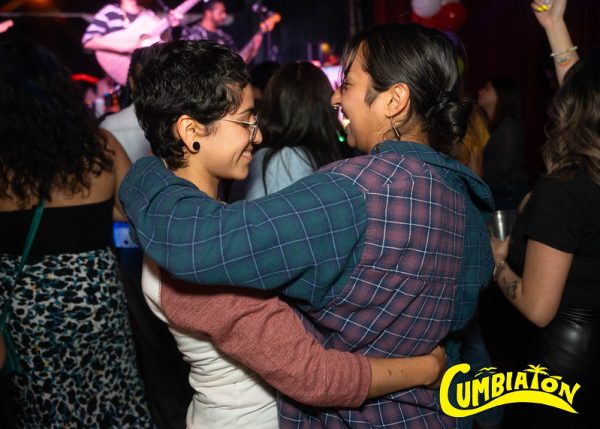
Couples, companions, comadres all dance together on the dancefloor at Cumbiatón. (Photo courtesy of Cumbiatón).
Cumbiatón was created during the first Trump administration as a direct response to the erasure, racism, homophobia and xenophobia that was engrained into the administration’s mission for those first four years. Now that the second Trump administration is upon us, the racism, homophobia, transphobia and xenophobia are tenfold.
This event space is a ‘party for the hood, by the hood.’ It is led by women, queer and trans people of color in every aspect of the production process.
The recent fires that burned through Altadena and Pacific Palisades made DJ Sizzle decide to step back from marketing the event in Los Angeles, an area where people had just lost their businesses, homes and where their lives were completely thrown for a loop.
Now they’re back, doubling-down on their mission to bring cumbias, corridos and all the music many of us grew up listening to, to places that are accessible and safe for our communities.
“I started Cumbiatón back in 2016, right after the election — which was weirdly similar because we’re going through it again. And a lot of us come from the Deferred Action for Childhood Arrivals (DACA) movement. We were the ones to really push for that to happen along with the DREAM Act.”
DJ Sizzle says that she wanted to create a space out on the streets to celebrate life and come together, because of how mentally and physically taxing it is to be a part of the marginalized communities that were and still are, a major target for ongoing political attacks.
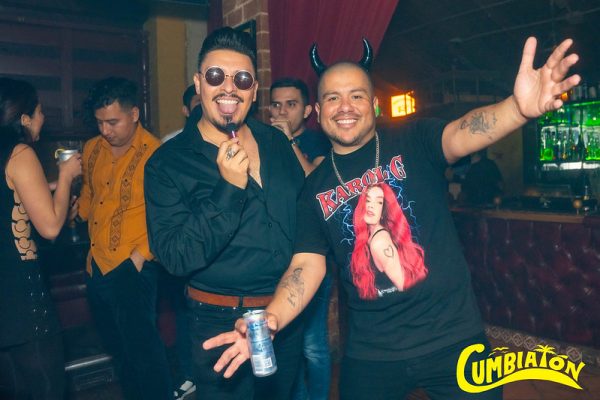
Edwin Soto and Julio Salgado pose for a photo at a Cumbiaton event in 2024. (Photo courtesy of Cumbiatón).
“We need these spaces so that we can kind of refuel and rejoice in each other’s existence,” said DJ Sizzle. “Because we saw each other out on the street a lot, but never did we really have time to sit down, have a drink, talk, laugh. So I found that music was the way to bring people together and that’s how Cumbiatón got started. It was honestly like a movement of political resistance through music.”
DJ Sizzle is an undocumented community organizer who aims to not only bring awareness to the issues that her communities face, but also to make space to celebrate the wins and bond over the music that brings people in Latin America, East L.A., Boyle Heights and the Bay area together.
Julio Salgado, a queer, visionary artist and migrant rights activist from Ensenada, Baja California with roots in Long Beach and the Bay Area, connected with DJ Sizzle over their shared passion in advocating for immigrant rights.
“Cumbiatón was created during the first [Trump] administration, where you know, a lot of people were really bummed out and so what Sizzle wanted to create was a place where people could come together and celebrate ourselves,” said Salgado. “Fast-forward to the second [Trump] administration and we’re here and feel a little bit more like: ‘oh shit, things are bad again.’ But, things have always been bad.”
Salgado is involved with Cumbiatón through his art. He is a mixed-media artist who creates cartoons using his lived experience with his sobriety journey, undocumented status and queer identity.
With a background in journalism from California State University, Long Beach, Salgado documents what activists do in the undocumented spaces he has been a part of throughout his life.
In 2017, Salgado moved back to Long Beach from the Bay Area, and at the time he started doing political artwork and posters for protests against the first Trump administration, but because the nature of that work can be very tiring, he says that he turned to a more uplifting version of his art where he also draws the joy and unity in his communities.
When he and Sizzle linked up to collaborate during that time, he thought he could use his skills to help uplift this brand and bring it to the forefront of the many events that saturate the party landscape.

DJ Sizzle doing her thing on stage, giving the crowd the music they went looking for. (Photo courtesy of Cumbiatón).
“We are familiar with using the dance floor as a way to kind of put the trauma a little bit away just for one night, get together and completely forget,” said Salgado.
Coming from an undocumented background, Salgado and Sizzle say that their experience with their legal status has made them very aware of how to go about the ID-check process at the door for their events.
“When you’re undocumented, you have something called a [High Security Consular Registration (HSCR)] and it’s kind of like your ID and many of these heterosexual clubs would see that and say it was fake,” said Salgado. “But at the gay club, they didn’t care.”
Just being conscious of what that form of ID looks like and knowing that it’s not fake, helps many of the hundreds of people who come through for Cumbiatón, feel just slightly more at ease.
Edwin Soto, who is another community activist and leader in the undocu-queer community, is also involved in the planning and organizing of the event.
In the long journey of making Cumbiatón what it is now, they say that they have all been very intentional about who they bring in, making sure that whoever they are, they also understand the experience of being undocumented and accepted anyway.
“Something that Sizzle and the team have been very intentional about is making sure that [the security at the door] knows that someone might be using their consulate card,” said Soto.
Bringing together this event space is no easy task, considering the fact that their events are deeply thought out, intentional and inclusive of not just people of color, but also people with differing abilities and people who do not reflect the norm in West Hollywood clubs.
“We created the space that we were longing for that we did not see in West Hollywood,” he said. “[Cumbiatón] is what life could really be like. Where women are not harassed by men. Where people are not body-shamed for what they’re wearing.”
When it comes to their lives outside of Cumbiatón and partying, Sizzle says that it does get exhausting and planning the event gets overwhelming.
“It is really difficult, I’m not going to lie,” said DJ Sizzle. “We are at a disadvantage being queer and being undocumented because this administration triggers us to a point that, anyone who is not a part of those identities or marginalized communities would ever be able to understand,” said Sizzle. “There are times where I’m just like: ‘I’m going to cocoon for a little bit’ and then that affects the marketing and the communication.”
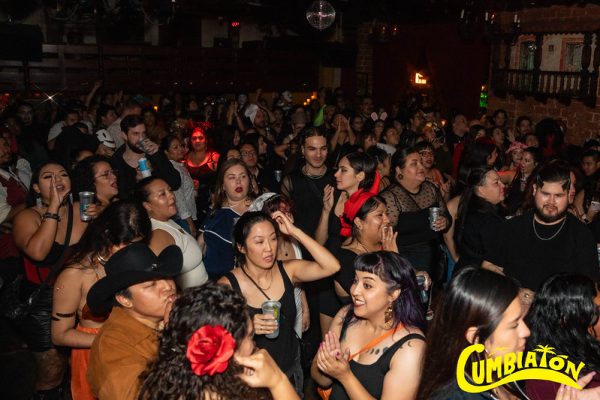
Usually, the events bring in hundreds of people who are looking for community, safety and inclusion. (Photo courtesy of Cumbiatón).
That’s a little bit about what goes on behind the scenes — which really shouldn’t come as a surprise for anyone who is out there fighting for basic human rights, while also making the space to party and enjoy themselves.
“I’m really trying to find balance and honestly my life raft are my friends and my community,” she said. “Like, being able to share, being able to have this plática, and be like ‘bitch, I see you and I know its fucked up, but we got each other.’”
Cumbiatón was made with the purpose of making space to include and invite the many different people in these communities who are otherwise sidelined in broader conversations and in party scenes where they are not as inclusive or thoughtful about their attendees.
“How beautiful is it to be queer and listen to rancheras and to norteñas and cumbia, and to just own it,” said Soto.
To join Cumbiatón at their next party, visit their Instagram page.
California
LA Pride 2025 announces grand marshals and parade theme
The parade will also pay tribute to the city’s first responders, relief organizations, agencies, officials and others who stepped up during the January fires

The theme for the parade set to take place on Sunday June 8, at 11 a.m., will fittingly be “Pride Marches On,” and this year’s parade grand marshals will be Niecy Nash-Betts and wife Jessica Betts, Andrew Rannells, and Trino Garcia and Adam Vasquez, who are also known as ‘TrinoxAdam.’
Rannells, a Grammy-winning, two-time Tony-nominated actor celebrated for his work on stage, screen, and television, is this year’s LA Pride Celebrity Grand Marshal.
“I’m truly honored to be this year’s Celebrity Grand Marshal of LA Pride,” said Rannells. “I don’t take it lightly and I just hope in some small way I can reflect the strength and resilience of the queer community, especially in times like these.”
Rannells made his TV directorial debut with Amazon’s “Modern Love” and is widely recognized for his role as Elijah Krantz on HBO’s “Girls,” which garnered a Critics Choice nomination. He recently appeared on Hulu’s “Welcome to Chippendales” and Showtime’s “Black Monday,” earning him yet another Critics Choice nomination. Rannells is also an author, director and Broadway actor.
Nash-Betts, one-half of this years Vanguard Marshals, is a multi-talented Emmy Award-winning actress, producer and director who has captivated audiences on many projects across the big screens. Soon, she will be making a big appearance starring opposite Kim Kardashian, Naomi Watts, Sarah Paulson, Teyana Taylor and Glenn Close, in Ryan Murphy’s “All’s Fair” Hulu TV series about an all-female legal firm.
Chicago native Betts will join her wife Nash-Betts as the other half of this years Vanguard Grand Marshal’s of the parade. Betts is an acclaimed singer-songwriter known for her original electric and acoustic rock and soul music. The two have been married since 2020 and in 2022, they made history as the first same-sex couple to grace the cover of Essence magazine, receiving a nomination for a GLAAD Media Award.
“We are thrilled to have Niecy Nash and Jessica Betts as this year’s Vanguard Grand Marshals,” said Gloria Bigelow, CSW board member. “As individuals and as a couple, they exemplify the beauty of living authentically and embracing love in all its forms. Their presence serves as a shining example for our community, reminding us to celebrate who we are, love fiercely and never back down from our Pride.”
TrinoxAdam will be this years Community Grand Marshals. The two are a loving gay couple who have dazzled the queer, Latin community with their content showcasing how they reclaim the cholo, or ‘xolo’ identities. They went viral on social media after sharing a romantic kiss on a bridge overlooking the 110 Freeway in Los Angeles. Now famous on social media, the two make content about their love, challenging traditional perceptions of masculinity, sexuality and Chicano culture.
“Pride is about loving yourself and accepting yourself for who you truly are,” said Trino Garcia and Adam Vasquez. “Being this year’s LA Pride’s Community Grand Marshals is the biggest honor and our greatest accomplishment, knowing we’ve made an impact and helped people find acceptance within themselves and finally feel the true meaning of Pride.”
This year, the parade will also pay tribute to the city’s first responders, relief organizations, agencies, officials and others who stepped up during the fires that devastated Altadena and Pacific Palisades, in a special “Heroes of the Wildfires” section in the lineup.

Los Angeles County Fire Department marches in the 2024 LA Pride Parade. (Photo courtesy of LA Pride)
“This year LA Pride marks a pivotal moment for both the Los Angeles and LGBTQ communities,” said Gerald Garth, CSW board president. “Despite facing unimaginable challenges, our community has always emerged stronger. This year’s theme, ‘Pride Marches On,’ symbolizes the strength of our community, and no matter the fire, hate or fear, Pride will always forge ahead. We look forward to embodying this spirit while celebrating resilience, hope and togetherness.”
The parade will be hosted by “Good Morning America” Saturday and Sunday co-anchor and ABC News transportation correspondent Gio Benitez and “ABC7 Eyewitness News” anchors Ellen Leyva and Coleen Sullivan.
After the Parade, LA Pride will host LA Pride Village on Hollywood Boulevard. Now in its fourth year, this free street festival will feature programming on two stages, welcome over 80 booths with local vendors and nonprofits, dozens of sponsor activations, giveaways, games, scores of food trucks, and two 21+ full-service bars.
For the third year in a row, LA Pride will also be featuring “Ballroom Battle,” the voguing competition created by New York City’s Black and Brown LGBTQ+ communities made famous by the documentary, “Paris is Burning,” Madonna, and the FX show “Pose.” LA’s premiere ballroom houses such as House of Miyake Mugler, House of Ninja, and House of Gorgeous Gucci will compete in front of celebrity judges, including Margaret Cho, who will also be in the parade, riding with longtime LA Pride alumni Project Angel Food.
A curated art exhibition called “Bring the T” will feature works in multiple media by trans artists that represent and explore themes around trans discrimination and erasure but also activism, determination and fearlessness.
The parade is set to broadcast live on Sunday, June 8, from 11 a.m. to 1 p.m. PDT on ABC7/KABC-TV Los Angeles.
The live broadcast will include comprehensive coverage from ABC7 news reporters David González, Sophie Flay and Kevin Ozebek, who will be reporting directly from the parade route, capturing all the festivities.
Features
Meet the new co-presidents of the NLGJA LA Chapter
The National Lesbian Gay Journalists Association’s LA Chapter under new leadership

An award-winning documentary filmmaker and a news producer make up the dynamic duo who now run the Los Angeles chapter of the NLGJA: The Association of LGBTQ+ Journalists.
NLGJA is a nationally recognized affinity group meant to unite journalists from dozens of different industries, who identify as members of the LGBTQ community.
The national chapter recognizes the work and contributions of LGBTQ journalists who work to further the narratives by queer, trans and gender non-conforming people.
Hansen Bursic, 27, pisces, is one half of the dynamic duo who now run the L.A chapter.
Katie Karl, 30, gemini, forms the other half.
Last year, Bursic and Karl took over as interim co-presidents and have been able to grow the local chapter to include a diverse and wide range of voices on the Board of Directors and on the membership list.
The chapter has hosted a long list of events that include collaborations with other local and national organizations with roots in Los Angeles, such as GALECA: Society of LGBTQ Entertainment Critics and the Asian American Journalists Association.
It became the first time in the Los Angeles chapter’s history that there was such a shift in leadership, with two people taking over the leading role.
“It was just too big of a job for one of us to do, especially in rebuilding. So we decided to get together and come on as co-president’s, which was recommended by the national president, Ken Miguel,” said Karl.
When it comes to the chapter’s mission, Bursic says it’s a two-fold goal.
“We want to build a sense of community for queer and trans journalists in Southern California and we also want to advocate for those journalists any chance we get by building the spaces where journalists can meet each other, breaking down barriers and trying to reduce gatekeeping of opportunities for our members so they can thrive and find a place in Southern California newsrooms,” he said.
Many of the events that are hosted by the NLGJA LA Chapter are free and open to the general public through RSVP. One of the common misconceptions the affinity group faces, is that many people feel as though their work may not directly correspond to the work pursued by current members of the group. However, that is not the case.
“Together, we really want to make sure that everyone feels included,” said Karl. “I’m in broadcast and Hansen is in documentary and together we really push to make sure that no matter what kind of journalist you are, you know there is a space for you and you feel welcomed.”
The organization welcomes members and people to attend their public events, who work in industries that are adjacent to the work journalists do and those who might just be creatives with multi-hypenated titles.
Bursic has a full-time day job in communications for a nonprofit, but his creative work extends far beyond his work in communications. His energy and passion lie in documentary filmmaking. Bursic recently directed and produced “Trans Heaven Pennsylvania” (2024). The 12-minute documentary is about the 2010s in Pennsylvania, where each year, a group of trans women would take over a small American town for a week-long party. The documentary was funded through the Creative Hope Initiative, an incubator for emerging LGBTQ filmmakers sponsored by Traverse32 and Outfest Film Festival.
The film most recently screened internationally in London, at the Bethnal Green Working Men’s Club. Its next screening will be at the Grandview Theater Drafthouse & Cinema in Columbus, Ohio on May 3rd.
Bursic has a notable list of accomplishments, including making the 30 under 30 list at Temple University in 2023. He has also been named a DOC NYC Documentary New Leader, has had a spot in the Ford Foundation Rockwood Documentary Leadership Fellowship and Sundance Film Festival Press Fellowship.
Karl was born and raised in the Greater Los Angeles area, is a dedicated news producer with extensive experience in live news coverage and team coordination. Currently a freelance writer and producer at KABC, she brings years of experience from her work at stations like KPNX, KHQ and KEYT.
Karl, says the experience of connecting with the members more, has been really rewarding.
“Going forward, my goal is to grow the chapter in name and recognition,” said Karl. “I want our [reach to get] across other organizations in other areas of journalism and that’s why I joined the board in the first place.”
Los Angeles
Los Angeles Blade names new publisher
Alexander Rodriguez brings deep media, business experience to outlet
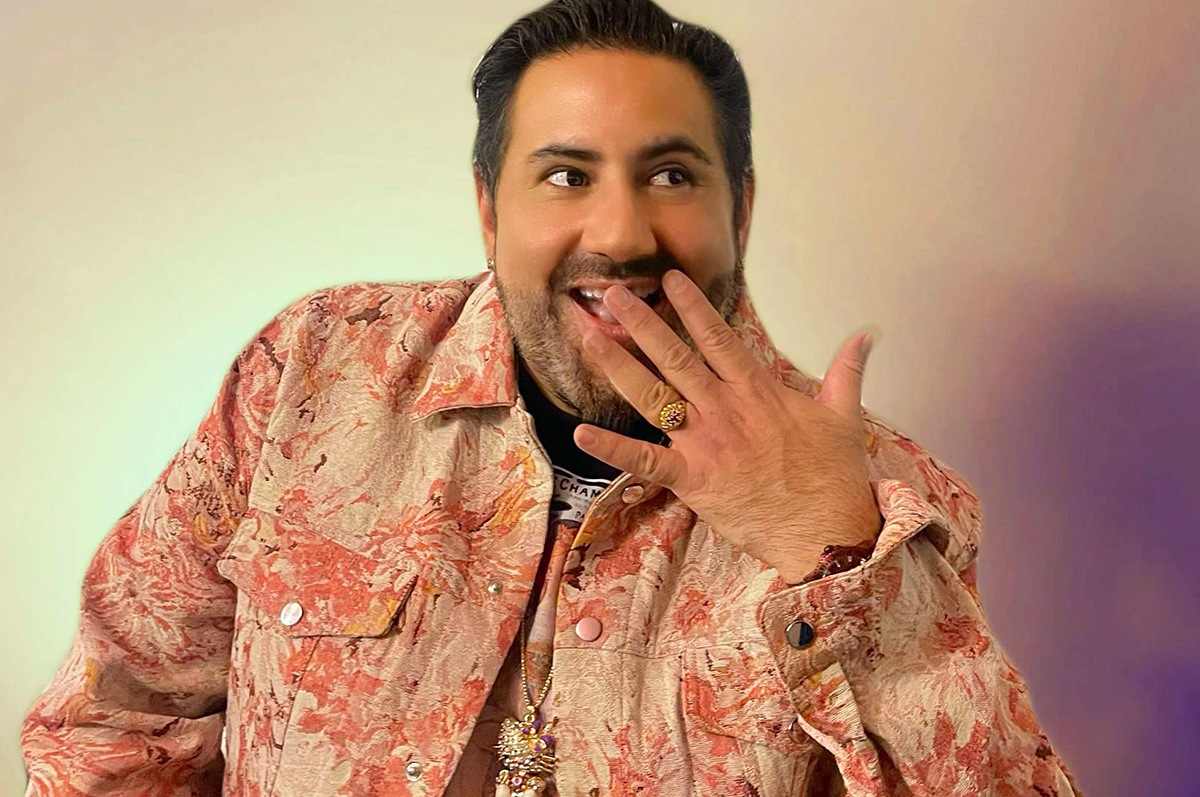
The Los Angeles Blade, Southern California’s leading LGBTQ news outlet, today announced the appointment of a new publisher, Alexander Rodriguez.
Rodriguez has a long background in queer media, business development, and a deep commitment to the Los Angeles community. He has worked as a lead writer and podcast host for Metrosource Magazine and for GED Magazine; content director for FleshBot Gay; and as host and producer for the “On the Rocks” podcast. On the business side, Rodriguez spent years working in business development in the banking industry throughout Los Angeles. He also has an extensive background in event planning and management and has served on the boards of many LGBTQ non-profits. As a TV and radio personality, he has served as emcee for LGBTQ events around the nation.
“I’m excited to bring my diverse media and business experience to the Los Angeles Blade,” Rodriguez said. “We will continue the Blade’s mission of serving as our community’s news outlet of record during these challenging times and work toward building bridges within our community and beyond.”
Rodriguez starts in his new role on Monday, Feb. 3.
“We are thrilled to welcome Alexander to the Blade team,” said Kevin Naff, one of the owners of the Los Angeles Blade. “His multimedia and business side experience will help us grow the Blade in L.A. and continue our commitment to best-in-class journalism serving the LGBTQ community in Southern California.”
Rodriguez becomes the Los Angeles Blade’s second publisher following the unexpected death of founding publisher Troy Masters in December. Masters served in the role for nearly eight years. The community will come together for a celebration of Masters’s life on Monday, Feb. 10, 7-9 p.m. at the Abbey.
“Troy’s legacy is in good hands with Alexander at the helm alongside our new local news editor, Gisselle Palomera,” Naff added.
The Los Angeles Blade, launched in 2017, celebrates its eighth anniversary in March. It is the sister publication of the Washington Blade, founded in 1969, which offers unmatched coverage of queer political news and is the only LGBTQ outlet in the White House press pool and the White House Correspondents’ Association, and the only LGBTQ outlet with a dedicated seat in the White House briefing room.
Alexander Rodriguez can be reached at [email protected].
Los Angeles
Broadway Cares/Equity Fights AIDS donates $500K to wildfire relief effort
Four local organizations received emergency grants

Broadway Cares/Equity Fights AIDS on Monday announced it has awarded $500,000 in emergency grants to organizations that are responding to the Los Angeles wildfires.
A press release notes the Entertainment Community Fund received $250,000, the California Fire Foundation Wildfire and Disaster Relief Fund received $100,000, the Los Angeles Regional Food Bank received $100,000, and Project Angel Food received $50,000.
“All of these organizations are providing much-needed, on-the-ground support for residents and first responders,” said Broadway Cares/Equity Fights AIDS.
“Our compassionate community knows the power of coming together in times of need,” added Broadway Cares Executive Director Danny Whitman. “Because of the generosity of the theater community — those onstage, backstage and in the audience — these emergency grants will immediately provide meals, shelter, medical care, clothing and emergency financial assistance, all first steps on the long road toward recovering, rebuilding, and healing.”
Los Angeles
The dedicated life and tragic death of gay publisher Troy Masters
‘Always working to bring awareness to causes larger than himself’

Troy Masters was a cheerleader. When my name was called as the Los Angeles Press Club’s Print Journalist of the Year for 2020, Troy leapt out of his seat with a whoop and an almost jazz-hand enthusiasm, thrilled that the mainstream audience attending the Southern California Journalism Awards gala that October night in 2021 recognized the value of the LGBTQ community’s Los Angeles Blade.
That joy has been extinguished. On Wednesday, Dec. 11, after frantic unanswered calls from his sister Tammy late Monday and Tuesday, Troy’s longtime friend and former partner Arturo Jiminez did a wellness check at Troy’s L.A. apartment and found him dead, with his beloved dog Cody quietly alive by his side. The L.A. Coroner determined Troy Masters died by suicide. No note was recovered. He was 63.
Considered smart, charming, committed to LGBTQ people and the LGBTQ press, Troy’s inexplicable suicide shook everyone, even those with whom he sometimes clashed.
Troy’s sister and mother – to whom he was absolutely devoted – are devastated. “We are still trying to navigate our lives without our precious brother/son. I want the world to know that Troy was loved and we always tried to let him know that,” says younger sister Tammy Masters.
Tammy was 16 when she discovered Troy was gay and outed him to their mother. A “busy-body sister,” Tammy picked up the phone at their Tennessee home and heard Troy talking with his college boyfriend. She confronted him and he begged her not to tell.
“Of course, I ran and told Mom,” Tammy says, chuckling during the phone call. “But she – like all mothers – knew it. She knew it from an early age but loved him unconditionally; 1979 was a time [in the Deep South] when this just was not spoken of. But that didn’t stop Mom from being in his corner.”
Mom even marched with Troy in his first Gay Pride Parade in New York City. “Mom said to him, ‘Oh, my! All these handsome men and not one of them has given me a second look! They are too busy checking each other out!” Tammy says, bursting into laughter. “Troy and my mother had that kind of understanding that she would always be there and always have his back!
“As for me,” she continues, “I have lost the brother that I used to fight for in any given situation. And I will continue to honor his cause and lifetime commitment to the rights and freedom for the LGBTQ community!”
Tammy adds: “The outpouring of love has been comforting at this difficult time and we thank all of you!”
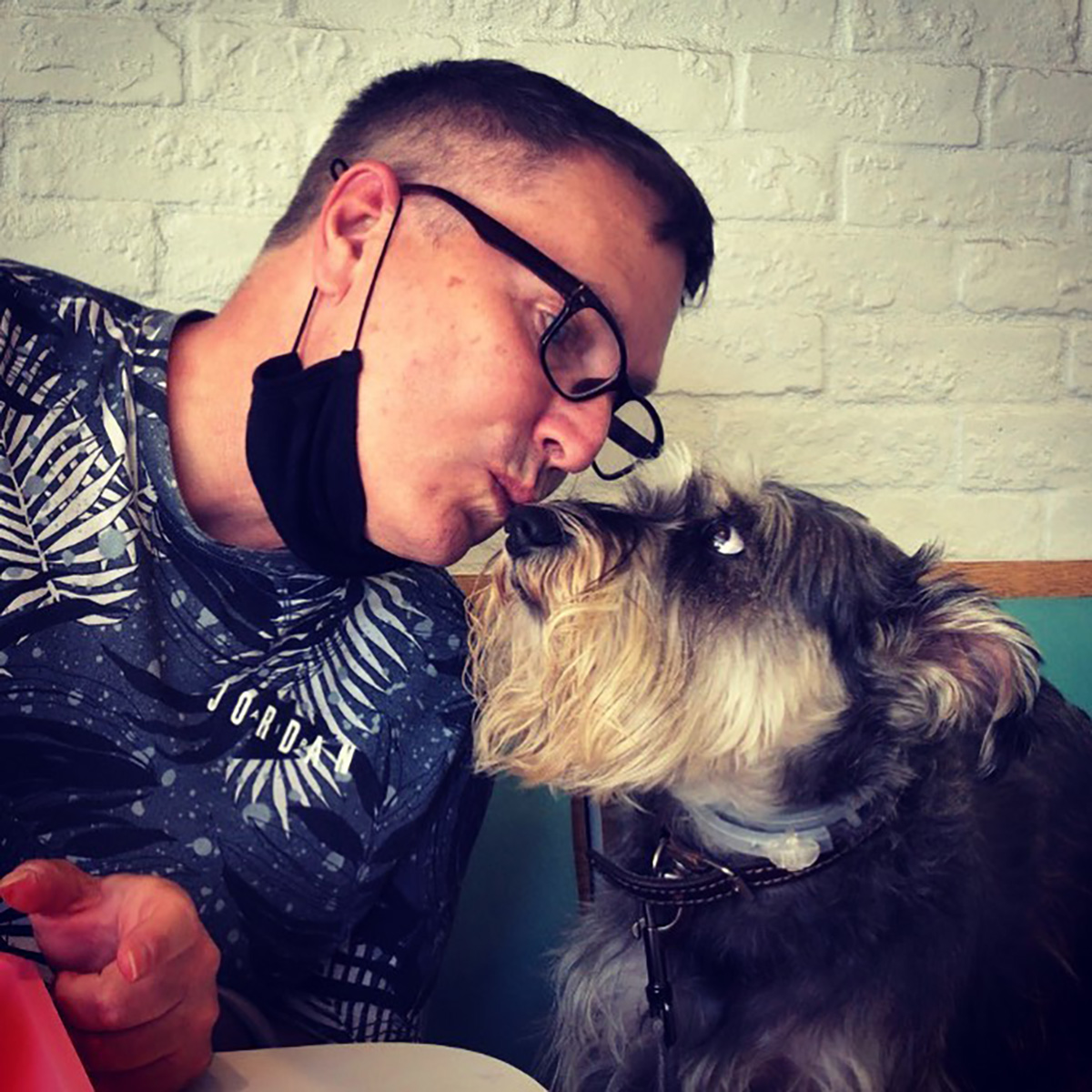
No one yet knows why Troy took his life. We may never know. But Troy and I often shared our deeply disturbing bouts with drowning depression. Waves would inexplicitly come upon us, triggered by sadness or an image or a thought we’d let get mangled in our unresolved, inescapable past trauma.
We survived because we shared our pain without judgment or shame. We may have argued – but in this, we trusted each other. We set everything else aside and respectfully, actively listened to the words and the pain within the words.
Listening, Indian philosopher Krishnamurti once said, is an act of love. And we practiced listening. We sought stories that led to laughter. That was the rope ladder out of the dark rabbit hole with its bottomless pit of bullying and endless suffering. Rung by rung, we’d talk and laugh and gripe about our beloved dogs.
I shared my 12 Step mantra when I got clean and sober: I will not drink, use or kill myself one minute at a time. A suicide survivor, I sought help and I urged him to seek help, too, since I was only a loving friend – and sometimes that’s not enough.
(If you need help, please reach out to talk with someone: call or text 988 Suicide and Crisis Lifeline. They also have services in Spanish and for the deaf.)
In 2015, Troy wrote a personal essay for Gay City News about his idyllic childhood in the 1960s with his sister in Nashville, where his stepfather was a prominent musician. The people he met “taught me a lot about having a mission in life.”
During summers, they went to Dothan, Ala., to hang out with his stepfather’s mother, Granny Alabama. But Troy learned about “adult conversation — often filled with derogatory expletives about Blacks and Jews” and felt “my safety there was fragile.”
It was a harsh revelation. “‘Troy is a queer,’ I overheard my stepfather say with energetic disgust to another family member,” Troy wrote. “Even at 13, I understood that my feelings for other boys were supposed to be secret. Now I knew terror. What my stepfather said humiliated me, sending an icy panic through my body that changed my demeanor and ruined my confidence. For the first time in my life, I felt depression and I became painfully shy. Alabama became a place, not of love, not of shelter, not of the magic of family, but of fear.”
At the public pool, “kids would scream, ‘faggot,’ ‘queer,’ ‘chicken,’ ‘homo,’ as they tried to dunk my head under the water. At one point, a big crowd joined in –– including kids I had known all my life –– and I was terrified they were trying to drown me.
“My depression became dangerous and I remember thinking of ways to hurt myself,” Troy wrote.
But Troy Masters — who left home at 17 and graduated from the University of Tennessee at Knoxville — focused on creating a life that prioritized being of service to his own intersectional LGBTQ people. He also practiced compassion and last August, Troy reached out to his dying stepfather. A 45-minute Facetime farewell turned into a lovefest of forgiveness and reconciliation.
Troy discovered his advocacy chops as an ad representative at the daring gay and lesbian activist publication Outweek from 1989 to 1991.
“We had no idea that hiring him would change someone’s life, its trajectory and create a lifelong commitment” to the LGBTQ press, says Outweek’s co-founder and former editor-in-chief Gabriel Rotello, now a TV producer. “He was great – always a pleasure to work with. He had very little drama – and there was a lot of drama at Outweek. It was a tumultuous time and I tended to hire people because of their activism,” including Michelangelo Signorile, Masha Gessen, and Sarah Pettit.
Rotello speculates that because Troy “knew what he was doing” in a difficult profession, he was determined to launch his own publication when Outweek folded. “I’ve always been very happy it happened that way for Troy,” Rotello says. “It was a cool thing.”
Troy and friends launched NYQ, renamed QW, funded by record producer and ACT UP supporter Bill Chafin. QW (QueerWeek) was the first glossy gay and lesbian magazine published in New York City featuring news, culture, and events. It lasted for 18 months until Chafin died of AIDS in 1992 at age 35.
The horrific Second Wave of AIDS was peaking in 1992 but New Yorkers had no gay news source to provide reliable information at the epicenter of the epidemic.
“When my business partner died of AIDS and I had to close shop, I was left hopeless and severely depressed while the epidemic raged around me. I was barely functioning,” Troy told VoyageLA in 2018. “But one day, a friend in Moscow, Masha Gessen, urged me to get off my back and get busy; New York’s LGBT community was suffering an urgent health care crisis, fighting for basic legal rights and against an increase in violence. That, she said, was not nothing and I needed to get back in the game.”
It took Troy about two years to launch the bi-weekly newspaper LGNY (Lesbian and Gay New York) out of his East Village apartment. The newspaper ran from 1994 to 2002 when it was re-launched as Gay City News with Paul Schindler as co-founder and Troy’s editor-in-chief for 20 years.

“We were always in total agreement that the work we were doing was important and that any story we delved into had to be done right,” Schindler wrote in Gay City News.
Though the two “sometimes famously crossed swords,” Troy’s sudden death has special meaning for Schindler. “I will always remember Troy’s sweetness and gentleness. Five days before his death, he texted me birthday wishes with the tag, ‘I hope you get a meaningful spanking today.’ That devilishness stays with me.”
Troy had “very high EI (Emotional Intelligence), Schindler says in a phone call. “He had so much insight into me. It was something he had about a lot of people – what kind of person they were; what they were really saying.”
Troy was also very mischievous. Schindler recounts a time when the two met a very important person in the newspaper business and Troy said something provocative. “I held my breath,” Schindler says. “But it worked. It was an icebreaker. He had the ability to connect quickly.”
The journalistic standard at LGNY and Gay City News was not a question of “objectivity” but fairness. “We’re pro-gay,” Schindler says, quoting Andy Humm. “Our reporting is clear advocacy yet I think we were viewed in New York as an honest broker.”
Schindler thinks Troy’s move to Los Angeles to jump-start his entrepreneurial spirit and reconnect with Arturo, who was already in L.A., was risky. “He was over 50,” Schindler says. “I was surprised and disappointed to lose a colleague – but he was always surprising.”
“In many ways, crossing the continent and starting a print newspaper venture in this digitally obsessed era was a high-wire, counter-intuitive decision,” Troy told VoyageLA. “But I have been relentlessly determined and absolutely confident that my decades of experience make me uniquely positioned to do this.”
Troy launched The Pride L.A. as part of the Mirror Media Group, which publishes the Santa Monica Mirror and other Westside community papers. But on June 12, 2016, the day of the Pulse Nightclub shooting in Orlando, Fla., Troy said he found MAGA paraphernalia in a partner’s office. He immediately plotted his exit. On March 10, 2017, Troy and the “internationally respected” Washington Blade announced the launch of the Los Angeles Blade.

In a March 23, 2017 commentary promising a commitment to journalistic excellence, Troy wrote: “We are living in a paradigm shifting moment in real time. You can feel it. Sometimes it’s overwhelming. Sometimes it’s toxic. Sometimes it’s perplexing, even terrifying. On the other hand, sometimes it’s just downright exhilarating. This moment is a profound opportunity to reexamine our roots and jumpstart our passion for full equality.”
Troy tried hard to keep that commitment, including writing a personal essay to illustrate that LGBTQ people are part of the #MeToo movement. In “Ending a Long Silence,” Troy wrote about being raped at 14 or 15 by an Amtrak employee on “The Floridian” traveling from Dothan, Ala., to Nashville.
“What I thought was innocent and flirtatious affection quickly turned sexual and into a full-fledged rape,” Troy wrote. “I panicked as he undressed me, unable to yell out and frozen by fear. I was falling into a deepening shame that was almost like a dissociation, something I found myself doing in moments of childhood stress from that moment on. Occasionally, even now.”
From the personal to the political, Troy Masters tried to inform and inspire LGBTQ people.
Richard Zaldivar, founder and executive director of The Wall Las Memorias Project, enjoyed seeing Troy at President Biden’s Pride party at the White House.
“Just recently he invited us to participate with the LA Blade and other partners to support the LGBTQ forum on Asylum Seekers and Immigrants. He cared about underserved community. He explored LGBTQ who were ignored and forgotten. He wanted to end HIV; help support people living with HIV but most of all, he fought for justice,” Zaldivar says. “I am saddened by his loss. His voice will never be forgotten. We will remember him as an unsung hero. May he rest in peace in the hands of God.”
Troy often featured Bamby Salcedo, founder, president/CEO of TransLatina Coalition, and scores of other trans folks. In 2018, Bamby and Maria Roman graced the cover of the Transgender Rock the Vote edition.
“It pains me to know that my dear, beautiful and amazing friend Troy is no longer with us … He always gave me and many people light,” Salcedo says. “I know that we are living in dark times right now and we need to understand that our ancestors and transcestors are the one who are going to walk us through these dark times… See you on the other side, my dear and beautiful sibling in the struggle, Troy Masters.”
“Troy was immensely committed to covering stories from the LGBTQ community. Following his move to Los Angeles from New York, he became dedicated to featuring news from the City of West Hollywood in the Los Angeles Blade and we worked with him for many years,” says Joshua Schare, director of Communications for the City of West Hollywood, who knew Troy for 30 years, starting in 1994 as a college intern at OUT Magazine.
“Like so many of us at the City of West Hollywood and in the region’s LGBTQ community, I will miss him and his day-to-day impact on our community.”

“Troy Masters was a visionary, mentor, and advocate; however, the title I most associated with him was friend,” says West Hollywood Mayor John Erickson. “Troy was always a sense of light and working to bring awareness to issues and causes larger than himself. He was an advocate for so many and for me personally, not having him in the world makes it a little less bright. Rest in Power, Troy. We will continue to cause good trouble on your behalf.”
Erickson adjourned the WeHo City Council meeting on Monday in his memory.
Masters launched the Los Angeles Blade with his partners from the Washington Blade, Lynne Brown, Kevin Naff, and Brian Pitts, in 2017.
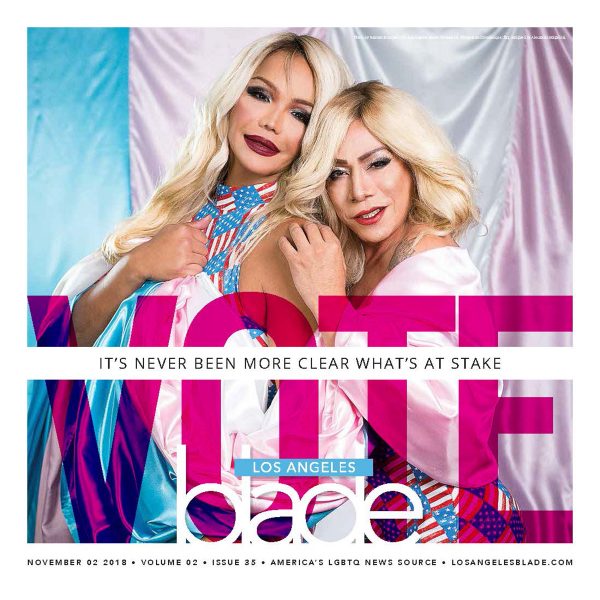
“Troy’s reputation in New York was well known and respected and we were so excited to start this new venture with him,” says Naff. “His passion and dedication to queer LA will be missed by so many. We will carry on the important work of the Los Angeles Blade — it’s part of his legacy and what he would want.”
AIDS Healthcare Foundation President Michael Weinstein, who collaborated with Troy on many projects, says he was “a champion of many things that are near and dear to our heart,” including “being in the forefront of alerting the community to the dangers of Mpox.”
“All of who he was creates a void that we all must try to fill,” Weinstein says. “His death by suicide reminds us that despite the many gains we have made, we’re not all right a lot of the time. The wounds that LGBT people have experienced throughout our lives are yet to be healed even as we face the political storm clouds ahead that will place even greater burdens on our psyches.”
May the memory and legacy of Troy Masters be a blessing.
Veteran LGBTQ journalist Karen Ocamb served as the news editor and reporter for the Los Angeles Blade.
Los Angeles
Los Angeles Blade publisher Troy Masters dies at 63
Longtime advocate for LGBTQ equality, queer journalism
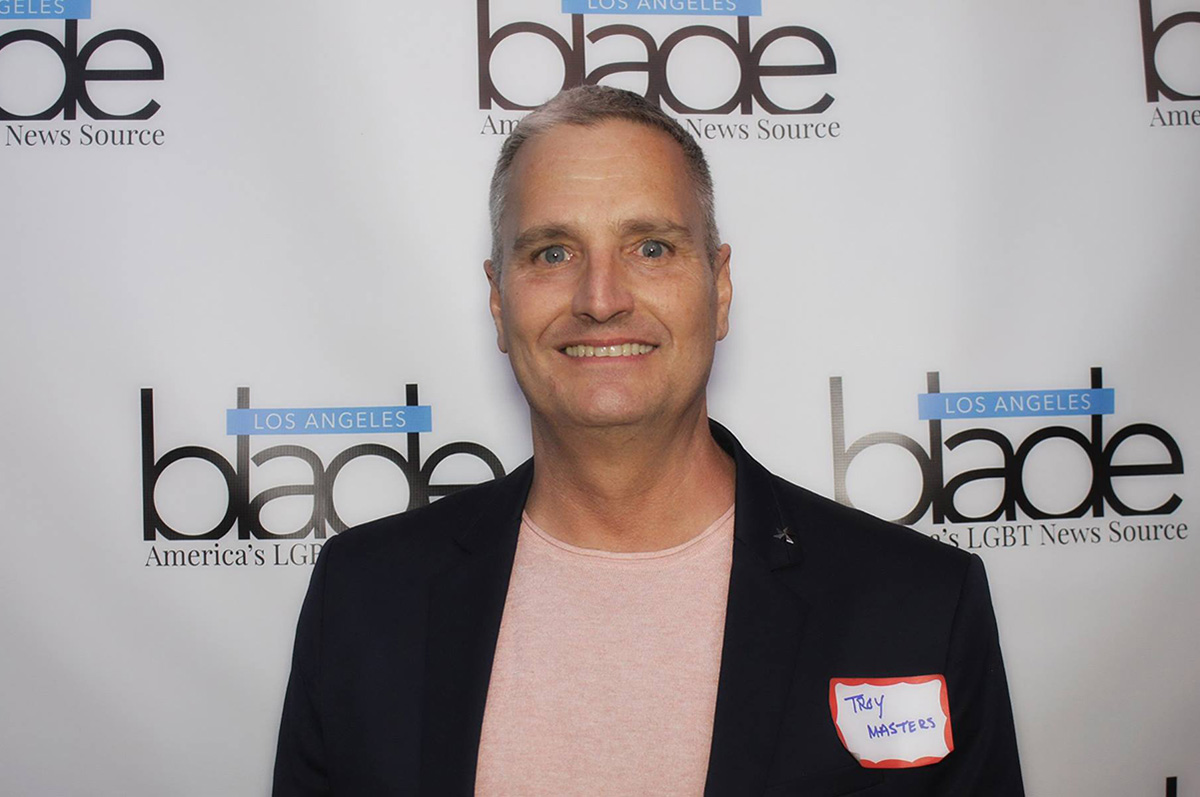
Troy Masters, publisher of the Los Angeles Blade, died unexpectedly on Wednesday Dec. 11, according to a family member. He was 63. The cause of death was not immediately released.
Masters is a well-respected and award-winning journalist and publisher with decades of experience, mostly in LGBTQ media. He founded Gay City News in New York City in 2002 and relocated to Los Angeles in 2015. In 2017, he became the founding publisher of the Los Angeles Blade, a sister publication of the Washington Blade, the nation’s oldest LGBTQ newspaper.
His family released a statement to the Blade on Thursday.
“We are shocked and devastated by the loss of Troy,” the statement says. “He was a tireless advocate for the LGBTQ community and leaves a tremendous legacy of fighting for social justice and equality. We ask for your prayers and for privacy as we mourn this unthinkable loss. We will announce details of a celebration of life in the near future.”
The Blade management team released the following statement on Thursday:
“All of us at the Los Angeles Blade and Washington Blade are heartbroken by the loss of our colleague. Troy Masters is a pioneer who championed LGBTQ rights as well as best-in-class journalism for our community. We will miss his passion and his tireless dedication to the Los Angeles queer community.
“We would like to thank the readers, advertisers, and supporters of the Los Angeles Blade, which will continue under the leadership of our local editor Gisselle Palomera, the entire Blade family in D.C. and L.A., and eventually under a new publisher.”
Troy Masters was born April 13, 1961 and is survived by his mother Josie Kirkland and his sister Tammy Masters, along with many friends and colleagues across the country. This is a developing story and will be updated as more details emerge.

Los Angeles
Ysabel Jurado claims victory: A new era for Los Angeles City Council District 14
The LGBTQ+ candidate maintained steady lead over incumbent Kevin De León, eventually declaring victory

Ysabel Jurado, the Highland Park resident and tenants rights’ attorney, is now Councilmember of Council District 14 after a battle for the hot seat against incumbent Kevin De León.
“Today, I am humbled to officially declare victory in the race for Los Angeles City Council District 14. This win is not mine—it belongs to our community,” said Jurado shortly after the win was announced.
Jurado makes history as the first Filipino American to serve on the Council and has expanded LGBTQ+ and women’s representation too.
In her celebratory statement after Thursday’s win, she stated that De León used Trump-like tactics and she is glad the city did not play into it.
“Trumpism has no place in CD-14– and we proved that by resoundingly rejecting the divisive tactics deployed by our opponent–tactics adopted directly from the Trump playbook,” said Jurado. “Like Trump, our opponent thumbed his nose at the law—from his racist gerrymandering scandal that likely violated the Voting Rights Act– to the current open investigation into his campaign for money laundering.”
Jurado is the new hope for a city that has been marred by racial and phobic remarks by those previously and still in positions of power.
Other news outlets are reporting that this marks another fallen Latino leader after the leaked L.A. City Council audio recording went viral in 2021 and led to the resignation of Los Angeles City Council president Nury Martínez.
De León’s goal during his term was to retain and expand Latin American political power.
With De León out, that leaves Latin Americans taking up only four out of the Council’s 15 seats, in a city that has a majority Latin American population. The city’s biggest Mexican American communities like Boyle Heights and El Sereno will not have a Latin American leader for the first time in nearly 40 years.
During De León’s campaign, he urged voters that if Jurado were to be elected, it would come at the expense of Latin American voices.
Last month, Eastside voters received a text message from De León’s campaign saying: ‘Forty years of Latino political power is under threat.’
Jurado secured her victory after placing first in the March primary, with support from Latin American politicians like Councilmember Hugo Soto-Martínez, L.A. Unified School District trustee Rocio Rivas, L.A. County Supervisor Hilda Solis and Councilmember Eunisses Hernandez, who replaced incumbent Gil Cedillo after he was also caught on audio making racist and defamatory remarks.
“These are heavy times, but Ysabel Jurado’s win is an incredible cause for hope,” said Hernandez in a congratulatory post on Instagram. “She has proven again and again that our city has not just the capacity to dream of a better future for ourselves, but that we demand it.”
De León tapped into the pathos of Eastside residents during his campaign, resorting to political tactics that attacked Jurado directly, rather than tackling the key issues at hand.
“Like Trump, he relied upon fear mongering, red-baiting, misogyny, and racial dog-whistling in an effort to divide us. But unlike Trump, his tactics failed.”
-

 Breaking News2 days ago
Breaking News2 days agoMajor victory for LGBTQ funding in LA County
-

 Features2 days ago
Features2 days agoKoaty & Sumner: Finding love in the adult industry
-

 a&e features5 days ago
a&e features5 days agoLatina Turner comes to Bring It To Brunch
-

 Books4 days ago
Books4 days agoTwo new books on dining out LGBTQ-style
-

 Miscellaneous1 day ago
Miscellaneous1 day agoCan you really find true love in LA? Insights from a queer matchmaker
-

 El Salvador2 days ago
El Salvador2 days agoLa marcha LGBTQ+ desafía el silencio en El Salvador
-

 Arts & Entertainment1 day ago
Arts & Entertainment1 day agoIntuitive Shana gives us her hot take for July’s tarot reading





